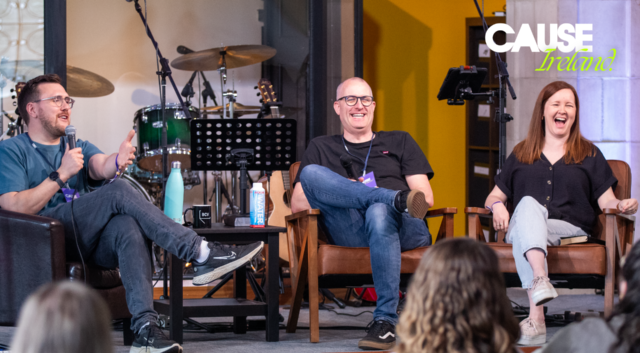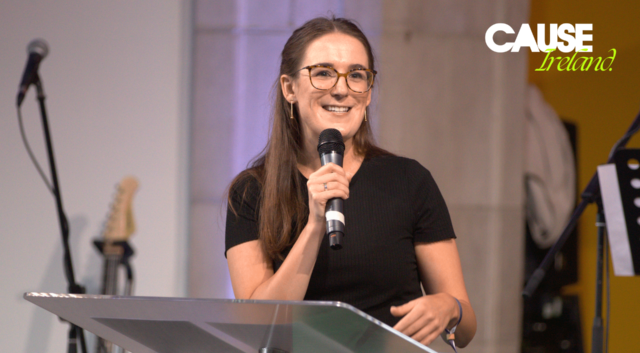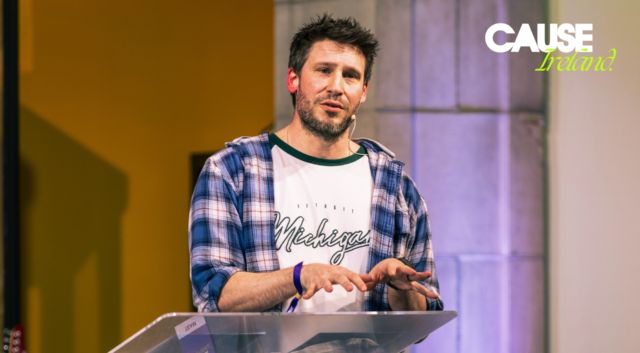How can churches maintain innovative practise and nurture, whilst growing from a church plant to an established church? Jim Denison pens some thoughts on how church plants can strike the balance between an expected trajectory of a traditional church whilst remaining radical.
I wanted to write some thoughts about a conundrum many church planters face. It is the issue that arises when they find that they are being pulled by their own gifts or by members of their team or even by the reporting systems of their own church movement towards traditional structures of “doing church” while they still recognise that their context is crying out for innovation and exploration in mission. How do you balance these things? How do you know when it is time to “shift tracks?” And is there a model that marries the two seemingly incompatible priorities?
Most Christians do not know how to church plant.
One thing I have found in my watching of church planters and having tried it three times is that most Christians do not know how to church plant. They know how to go to church. This inevitably results in huge pressure for the planters who are engaged with the context to come up with a missional strategy that truly impacts an area and not just suck transfer growth into their “more interesting show.” This is a really difficult pressure to resist.
But likewise I have seen planters who have worked previously on church staff teams who have over years of such work sharpened their skill set for the delivery of “church programmes” and not incarnational missional living. These planters so often look to quickly move to a strategy that allows them to preach asap and this inevitably results in moving to services and programmes before the culture of that area has been penetrated. This too can shipwreck a plant.
So what is the balance?
First, we need to go back and recognise anew some cultural markers. We are not in the mainstream of culture any longer. Church is not on the menu for over 90% of our compatriots. Look at that number. 90%! This is a strategic anomaly that must be considered. This means that we are not even a post-Christian culture any longer. We have turned the corner into a pre-Christian reality. This provides us with an imperative to innovate and learn how to do incarnational ministry in our context in the power of the Kingdom. I wouldn’t presume to suggest what that is for your context, however I have seen many many different options. Know your city. Know your interests. Know the bondages of your city. I have seen community choirs, wine tasting, charity gigs, sports teams, For-profit businesses, coffee shops, charities dedicated to serving the disadvantaged etc… all used as means to penetrate pre-Christian cultures and build spiritual and real connections that the Kingdom can travel across. This is a non-negotiable.
Everything gets filtered thought 1000 years of tradition.
Yet, there is an established church in the UK and a strong, lingering cultural memory back to the days of Christendom where – as if in a dream – Christianity was the accepted norm. So certain things of which they have no real knowledge are yet indicators of legitimacy versus cult-like opportunists. I would add to this list a Sunday service, a Church building & even titles. They aren’t the slightest bit interested but they look for it before they would come within a mile. One mentor of whom I was seeking advice before moving to the UK told me that after 20 years of ministry here, “innovation is not a natural good in the UK like north America. Everything gets filtered thought 1000 years of tradition.” Never have truer words been said.
So how do we do this?
As I see it you have three options:
1.) Try to get the city to buy into your traditional church structures asap. This will inevitably require a huge outlay of resources because the context currently has nothing so much will need to be brought in and over a very short time a buzz created. Churches like this are resource heavy but generate a real buzz and quickly create a critical mass. This a strength. They establish a foothold in an area through the traditional means quickly. However a weakness that could be seen is the relative weakness of contextual penetration of pre-Christian people who find traditional structures archaic. Unfortunately that group consists of the majority of the UK’s population.
2.) A second option is to abandon traditional structures altogether and employ what Neil Cole calls the “organic” model. This structure focuses on discipling a few people in a context so that they can use Kingdom resources to lead others to Jesus and plant smaller, third-space oriented communities that quickly multiply other similar communities so that there is little overhead and smaller, richer connection in those communities. This is not house church because it is meant to multiply very quickly through effective discipleship which trains the new Christians in incarnational impact. It is meant to infiltrate pre-Christian societies. Yet a weakness here is the lack of traditional structures that our culture still looks for as indicators of legitimacy. Most Britons will be extremely wary of an approach this unfamiliar. Which dooms this approach to a fringe role in the society.
We have turned the corner into a pre-Christian reality
Often this type of approach is what we feel like we are struggling to deal with during the initial phases of the classic Vineyard “inside out” strategy. Grow a small group and multiply it. Grow those groups and multiply them. Then start a Sunday. How do I get people to my small group so that I can multiply it when we have no structures they recognise or trust? “The come to our parties but I can’t get them to come to small group.” Do you just go with transfer growth because Christians will recognise the small group structure? But from moment one they are asking “when are we going to Sundays?”
3.) So, with those options seemingly presenting strengths AND weaknesses, is it possible to marry the best of both these insights so as to create a balanced strategy? Is there such a thing as a “Hybrid” of these two ideas? My opinion is yes.
From our perspective in Canterbury, we have stumbled upon a strategy that steals unashamedly from both of these rich strategic resources. We call it “The Hybrid Model” and to illustrate it we use a Large manor house with no back wall leading out onto a vast back garden. Stay with me.
When we moved to Canterbury we did so having learned the lesson of the weaknesses of option 2 above in our church planting adventures in Watford. We chose an organic model but quickly learned its difficulties and actually the incompatibility of such an approach with my gift set of communication. We felt the Lord release us from “emerging church guilt” in order to use some traditional structures in a practical way so that our approach was more culturally savvy and balanced.
Here was a buzz around town about something new that was innovating with prejudice confounding lifestyles.
The way we did this is called “the outside in strategy.” We married a relentless networking approach of coffee appointments, parties and connecting to people through strategic people of peace (see Luke 10) with a once a month “Preview service” strategy beginning in month 4. What we found was that the people we were meeting through conversations, prejudice confounding parties, networking, cups of coffee & servant evangelism (i.e. option 2) then had a frame of reference for us and a safe, anonymous gathering in which to “check us out” and explore what we were talking about (i.e. option 1).
This led to a rapid growth of the Previews through transfer growth because there was a buzz around town about something new that was innovating with prejudice confounding lifestyles but an accessible gathering with worship, teaching & ministry. Oh yeah, did I mention that this service was in a wine bar? I think that helped bring a flavour of option 2 to the option 1 tactic.
The problem with the transfer growth was that we were quickly thrust into a situation where we were discipling Christians in our “incarnational model” rather than doing it ourselves now. We began a midweek “Launch team meeting” where the incarnational and missional DNA was taught and this too grew with people who had thrown their hats in the ring with us. But again we were not able to be as “out there” as we wanted because we were now in programme land. (A quick comment: It is always slower and less effective to train established Christian in incarnational ministry than to make new Disciples who you then train in incarnational, Kingdom lifestyles. That is all.)
If I had it to do all over again I would spend less time in the Launch team gatherings teaching and more time going out as a team and doing incarnational stuff so that we saw more new Disciples and for the Christian on the Launch team it was caught rather than taught. I guess this was evidence of my own lack of incarnational skill during my many years serving on church staff teams. I really wish we had stayed locked into networking and parties and incarnation as our primary function for longer so that this DNA also served as an Ockham’s razor amidst the transfer growth. We too quickly drifted into church leadership with a core value of mission rather than incarnational mission with a church to support it.
For the Christian on the Launch team it was caught rather than taught.
To rectify this we have implemented this analogy of the Manor House. Let me explain:
The Manor House represents the “shop window” of our Sunday services, church programmes and small groups that we provide to have a credible cultural position. It serves as a “slip road” and the front door for many who find that means accessible and some who just need it there to feel comfortable. Interestingly, most Christians only understand discipleship thru these types of lenses and need it as much as the culture.
Sunday services, church programmes and small groups provide….a credible cultural position.
However the house has no back wall. This is because it is not meant as a destination. It is a means to an end. Discipleship.
Some, we realise, will never make it into the back garden. However we want to make sure that we take away an impediment to them doing so. Discipleship is not “knowing stuff and developing your church world muscles of serving on a rota and giving.” Discipleship is a lifestyle of incarnational, Kingdom empowered mission. This is the back garden. So our courses and programmes in the Manor House equip, provide practicum and cast vision for this goal.
Once we get someone into the back garden they are not barred from utilising the resources of the house, we just want them impacting their networks with the Kingdom. The next step is for them to disciple those who respond themselves and create communities outside the Manor House programmatic template so that it truly works for the context of that network. This means that if the back garden starts kicking into gear as a missional vehicle we will see infinite slip roads of entry into the Life of The Canterbury Vineyard Family because the networks are as plentiful as the number of disciples we can equip and encourage out into the back garden of incarnational Kingdom lifestyle…All done with legitimacy of cultural indicators as provided by the Manor House “shop windows” of Sunday services, employed staff and programmes.
We mustn’t get lost in the morass of church management/leadership
It is my hope that one day the power of our disciples are of such quality and boldness that the Manor House becomes negotiable or we re-think it in fresh ways. It is to my mind a strategic necessity for this cultural moment. I also find it a poor reflection of success or failure. Buzz does not equal “success.” However buzz can be a step on the road to impact and “success.” Yet the use of previews in planting and Sundays & other programmes since have provided a very helpful balance to the incarnational mission that is our true realm of success or failure. I think it helps us be practical and understand that we mustn’t get lost in the morass of church management/leadership too soon when in the planting fields but we can use some of that stuff to solidify and ground the networking and partying and treasure hunting and dinner parties that are earning us connections but not necessarily trust.









